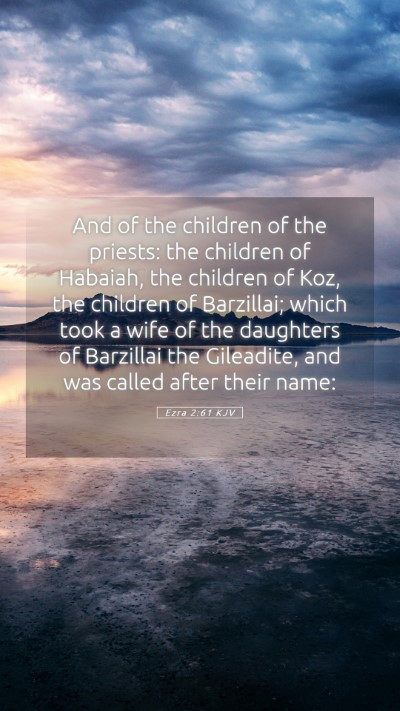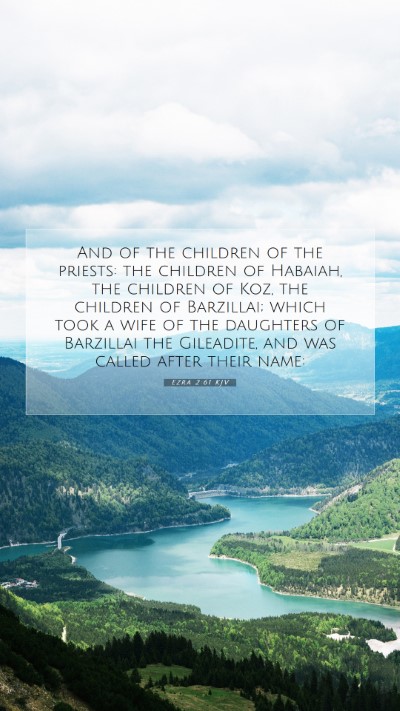Understanding Ezra 2:61
Ezra 2:61 pertains to the descendants of the priests who were unable to establish their genealogical connection, rendering them ineligible to serve in the priestly capacity. This verse serves to emphasize the importance of priestly lineage and the ramifications of such lineages in returning to the Promised Land after exile.
In this analysis, we draw from the insights of renowned public domain commentaries to provide a comprehensive understanding of this verse covering its context, implications, and significance.
Contextual Background
The Book of Ezra documents the return of the exiles from Babylon to Jerusalem after the decree of Cyrus the Great. The focus in Ezra 2 is on the list of those who returned, highlighting the various groups such as priests, Levites, and laypeople. Understanding this verse requires recognizing the historical circumstances surrounding the Jewish people during the Babylonian exile and their return.
Verse Analysis
- Genealogical Significance: As pointed out by Matthew Henry, the importance of genealogies in the Jewish culture gives this verse its weight. The ability to trace one’s lineage back to Aaron, the brother of Moses, was paramount for priestly service.
- Ineligibility: Albert Barnes speaks of how this inability to prove their lineage left these priests in a state of uncertainty regarding their roles in the temple, representing a loss of identity and purpose for some who sought to reclaim their heritage.
- Spiritual Implications: According to Adam Clarke, this highlights the broader theme of God's order in worship and service. It reinforces that not all who wish to serve in sacred roles meet the necessary criteria outlined in the Law.
Thematic Insights
The themes drawn from Ezra 2:61 resonate with several critical biblical concepts:
- Identity and Heritage: The inability to prove one’s lineage signifies the broader spiritual question of identity among God’s people.
- Divine Order: The restrictions placed on who can serve as priests reinforce the significance of divine appointment in leadership roles.
- Restoration:** During the return from exile, the physical and spiritual restoration of the populace was emblematic of God's faithfulness to His covenant.
Cross References
- Nehemiah 7:63-65 - Further discussion of the ineligibility of certain priests.
- 1 Chronicles 24:1-19 - Details on the division of priestly duties among the descendants of Aaron.
- Ezekiel 44:10-15 - The expectations for the Levitical priests and their qualifications.
Bible Study Insights
For those engaged in Bible study, exploring passages like Ezra 2:61 can enrich our understanding of the biblical text and lead to deeper reflections about God's design in church order and worship. In Bible study groups or online Bible study platforms, discussions can revolve around how historical contexts apply to modern worship practices.
Applications for Daily Life
While the verse discusses specific historical and cultural conditions, its implications extend to contemporary believers:
- Seeking Identity: Just as the priests sought their identity through lineage, believers today can seek their identity in Christ, finding a greater purpose in the spiritual lineage through faith.
- Understanding Callings: As with the restrictions on serving as priests, believers are encouraged to understand their own spiritual gifts and callings rather than assuming roles without proper discernment and alignment with God’s will.
- Embracing Community: The assembly of exiles underscores the importance of community in faith. Today, congregants are called to engage with one another responsibly and lovingly.
Conclusion
In conclusion, Ezra 2:61 serves not only as an account of genealogy but also invites profound reflection on the nature of service, identity, and the commitment to fulfilling God's ordained roles within His community. For those exploring Bible verse meanings, interpretations, and commentaries, this verse provides a pathway into deeper understanding and application of Scripture.


